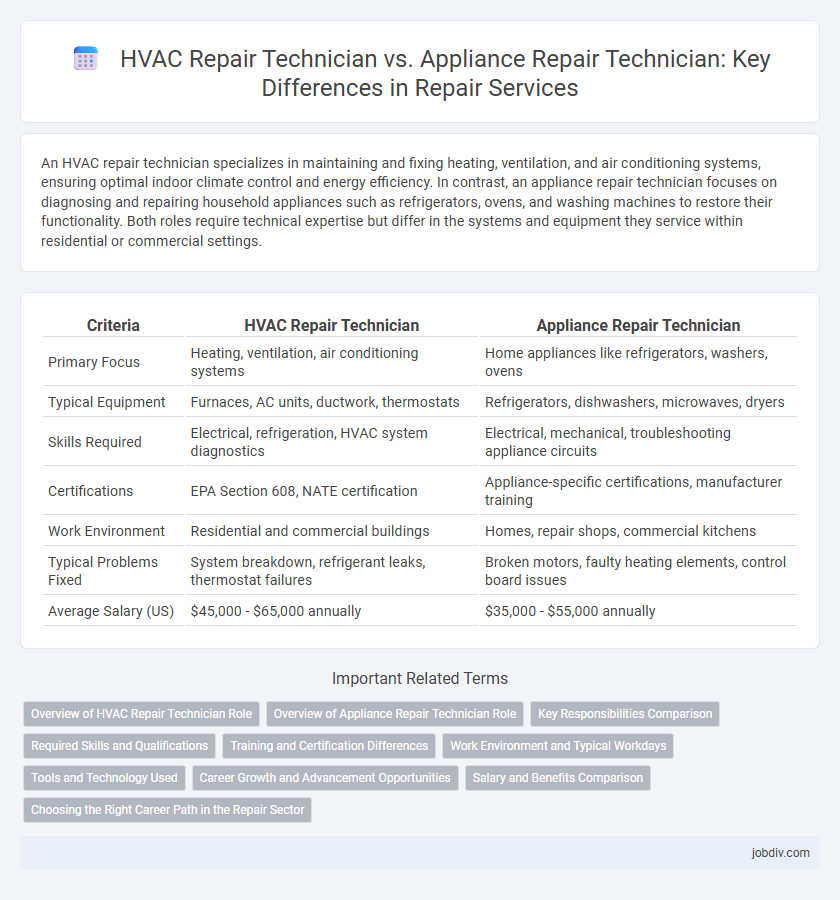An HVAC repair technician specializes in maintaining and fixing heating, ventilation, and air conditioning systems, ensuring optimal indoor climate control and energy efficiency. In contrast, an appliance repair technician focuses on diagnosing and repairing household appliances such as refrigerators, ovens, and washing machines to restore their functionality. Both roles require technical expertise but differ in the systems and equipment they service within residential or commercial settings.
Table of Comparison
| Criteria | HVAC Repair Technician | Appliance Repair Technician |
|---|---|---|
| Primary Focus | Heating, ventilation, air conditioning systems | Home appliances like refrigerators, washers, ovens |
| Typical Equipment | Furnaces, AC units, ductwork, thermostats | Refrigerators, dishwashers, microwaves, dryers |
| Skills Required | Electrical, refrigeration, HVAC system diagnostics | Electrical, mechanical, troubleshooting appliance circuits |
| Certifications | EPA Section 608, NATE certification | Appliance-specific certifications, manufacturer training |
| Work Environment | Residential and commercial buildings | Homes, repair shops, commercial kitchens |
| Typical Problems Fixed | System breakdown, refrigerant leaks, thermostat failures | Broken motors, faulty heating elements, control board issues |
| Average Salary (US) | $45,000 - $65,000 annually | $35,000 - $55,000 annually |
Overview of HVAC Repair Technician Role
HVAC repair technicians specialize in diagnosing, maintaining, and fixing heating, ventilation, and air conditioning systems in residential and commercial settings. They handle equipment such as furnaces, air conditioners, heat pumps, and ventilation units, ensuring optimal indoor air quality and temperature control. These professionals require knowledge of electrical systems, refrigeration cycles, and safety protocols to efficiently troubleshoot and perform repairs.
Overview of Appliance Repair Technician Role
An Appliance Repair Technician specializes in diagnosing and fixing household appliances such as refrigerators, washing machines, ovens, and dishwashers, ensuring they operate efficiently and safely. Their expertise includes electrical, mechanical, and electronic system repairs, often requiring knowledge of various brands and models. This role demands strong troubleshooting skills, familiarity with warranty guidelines, and the ability to communicate repairs and maintenance advice to customers effectively.
Key Responsibilities Comparison
HVAC Repair Technicians specialize in diagnosing and fixing heating, ventilation, and air conditioning systems, ensuring optimal climate control and energy efficiency in residential and commercial buildings. Appliance Repair Technicians focus on repairing household appliances such as refrigerators, washing machines, and ovens, addressing mechanical and electrical malfunctions to restore functionality. Both roles require expertise in troubleshooting, component replacement, and preventive maintenance, but HVAC technicians must also manage refrigerant handling and system calibration compliant with environmental regulations.
Required Skills and Qualifications
HVAC Repair Technicians specialize in heating, ventilation, and air conditioning systems, requiring strong knowledge of electrical systems, refrigeration, and HVAC-specific regulations like EPA certification. Appliance Repair Technicians must be proficient in diagnosing and fixing a wide range of household appliances, emphasizing skills in mechanical repair, wiring, and familiarity with brand-specific technology. Both roles demand strong problem-solving abilities, technical training, and experience with diagnostic tools to ensure accurate and efficient repairs.
Training and Certification Differences
HVAC repair technicians undergo specialized training in heating, ventilation, and air conditioning systems, often obtaining certifications such as EPA Section 608 to handle refrigerants safely. Appliance repair technicians receive broader training covering various home appliances, including refrigerators, washers, and ovens, with certifications typically emphasizing electrical safety and manufacturer-specific technologies. The distinct certification requirements reflect the specialized technical skills and regulatory compliance unique to each profession.
Work Environment and Typical Workdays
HVAC repair technicians typically work in a variety of environments including residential homes, commercial buildings, and outdoor locations, facing exposure to varying weather conditions and confined spaces. Their workdays often involve diagnosing and fixing heating, ventilation, and air conditioning systems, requiring physical stamina and troubleshooting skills. Appliance repair technicians usually operate indoors within kitchens or laundry areas, focusing on repairing household appliances such as refrigerators, washers, and microwaves, with more predictable and controlled working conditions.
Tools and Technology Used
HVAC repair technicians utilize specialized tools such as refrigerant gauges, multimeters, and thermal imaging cameras to diagnose and repair heating, ventilation, and air conditioning systems, often incorporating smart thermostat technology and advanced HVAC software for precise calibration. Appliance repair technicians rely on diagnostic multimeters, socket sets, and circuit testers to troubleshoot household appliances like refrigerators, washers, and ovens, frequently using manufacturer-specific diagnostic software and mobile apps for efficient repairs. Both professionals require a blend of traditional hand tools and modern digital technology tailored to their specific repair domains, enhancing accuracy and efficiency in service delivery.
Career Growth and Advancement Opportunities
HVAC repair technicians often experience robust career growth due to the increasing demand for energy-efficient heating and cooling systems and expanding green technology sectors. Appliance repair technicians may face slower advancement opportunities as market trends shift towards appliance replacement rather than repair, impacting long-term job stability. Certifications like EPA Section 608 for HVAC and manufacturer-specific credentials enhance career prospects and earning potential in both fields.
Salary and Benefits Comparison
HVAC repair technicians typically earn an average salary of $50,000 to $65,000 annually, with benefits often including health insurance, retirement plans, and paid training due to the technical nature of their work. Appliance repair technicians generally have a salary range of $35,000 to $50,000 per year, with benefits varying more widely based on employer size and may include limited health coverage and fewer retirement options. The higher compensation and more comprehensive benefits for HVAC technicians reflect the specialized skills and certifications required to handle complex heating and cooling systems.
Choosing the Right Career Path in the Repair Sector
HVAC repair technicians specialize in heating, ventilation, and air conditioning systems, requiring expertise in electrical components, refrigerants, and climate control technologies. Appliance repair technicians focus on household devices like refrigerators, washers, and ovens, needing knowledge of mechanical systems and electronic diagnostics. Selecting the right career path depends on your interest in working with large-scale climate systems versus everyday household appliances, as well as the technical skills and certifications you are willing to pursue.
HVAC Repair Technician vs Appliance Repair Technician Infographic

 jobdiv.com
jobdiv.com